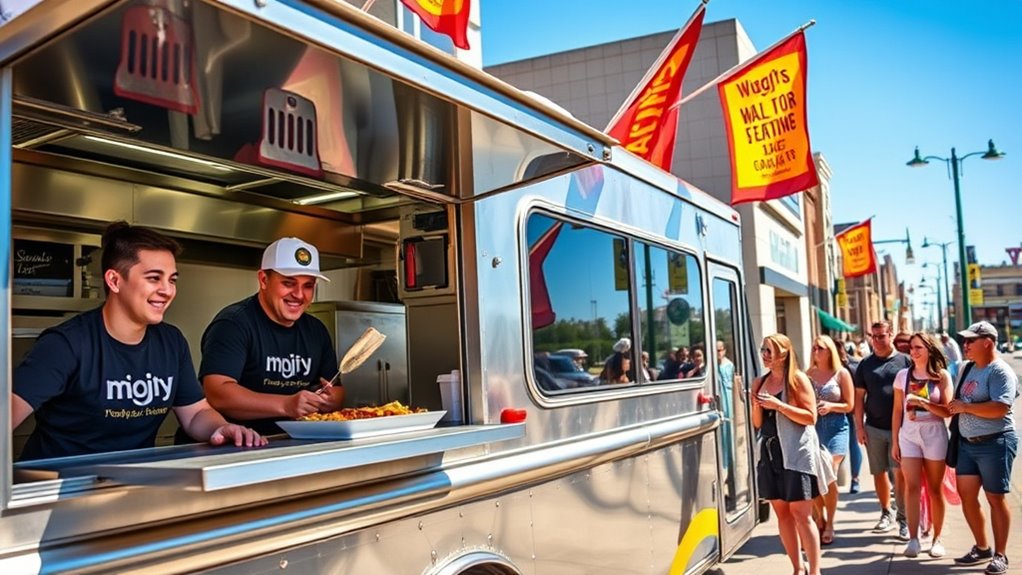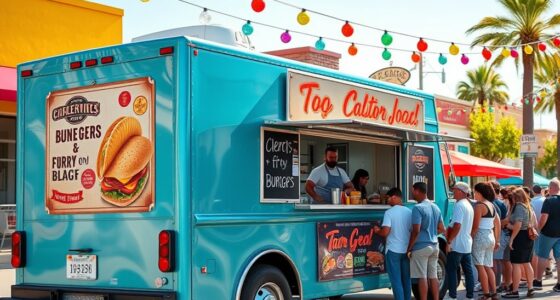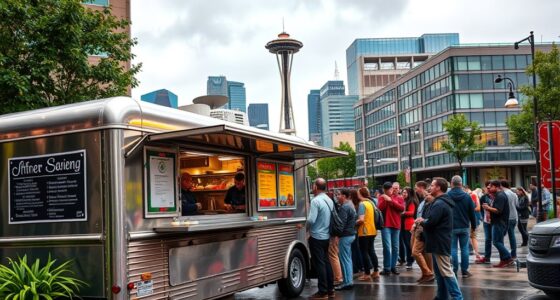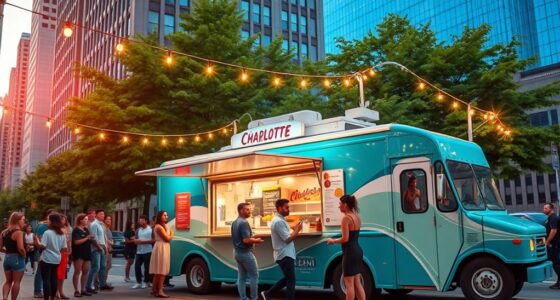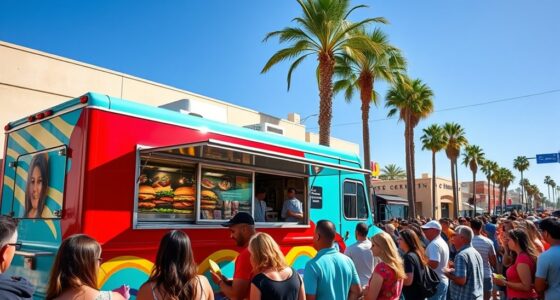To start a food truck in Wichita, KS, you need to focus on local food trends, like regional BBQ and farm-fresh ingredients, to attract customers. Obtain necessary permits from the Kansas Department of Agriculture and Wichita health officials. Set up your operations, budget for vehicle modifications, equipment, and permits, and develop a menu that showcases local flavors. Building community relationships and leveraging local events will boost your presence—continue to explore these strategies to launch successfully.
Key Takeaways
- Obtain necessary food truck licenses and permits from the Kansas Department of Agriculture and Wichita health authorities.
- Develop a menu emphasizing local ingredients and regional favorites to attract Wichita residents and visitors.
- Budget for vehicle modifications, equipment, permits, insurance, and explore funding options like grants and investors.
- Choose compliant shared kitchen spaces and acquire durable, efficient appliances tailored to your menu needs.
- Utilize technology for secure payments, inventory management, and promote your truck through social media and community events.
Starting With Local Food Trends
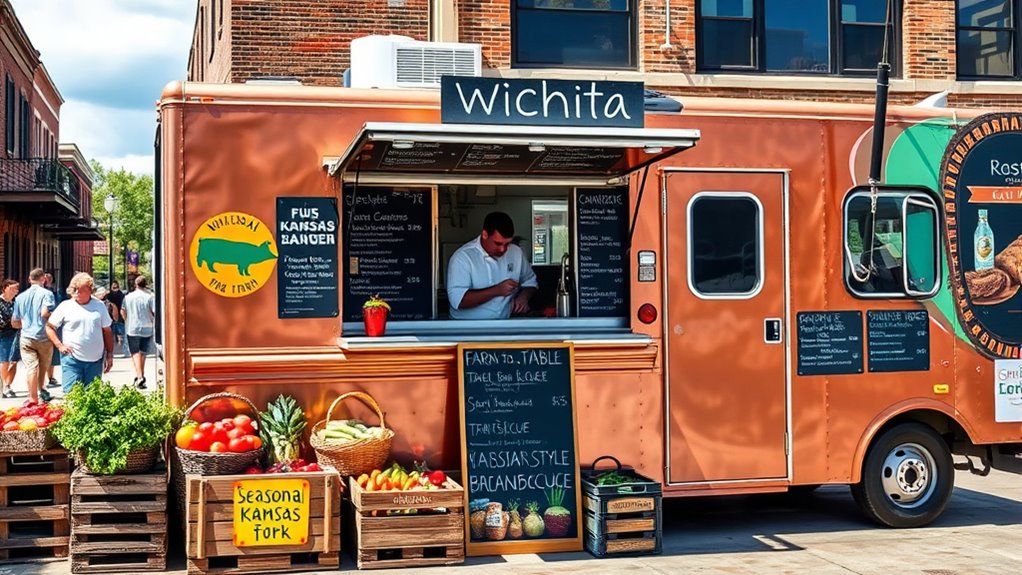
To successfully launch your food truck in Wichita, it’s essential to start by understanding and incorporating local food trends. Wichita’s vibrant food scene thrives on local flavor and regional favorites that resonate with residents and visitors alike. Focus on dishes that highlight regional ingredients and culinary traditions, such as Kansas-style barbecue or farm-fresh ingredients from nearby farms. By embracing these local flavors, you’ll connect authentically with your community and stand out in a competitive market. Research popular local dishes and incorporate them into your menu, adding your unique twist. Staying attuned to regional favorites helps you create a menu that appeals to locals’ tastes and celebrates Wichita’s culinary identity. This approach sets a strong foundation for your food truck’s success. Additionally, understanding signs of spoilage in ingredients ensures your dishes remain fresh and safe for customers.
Understanding Local Requirements
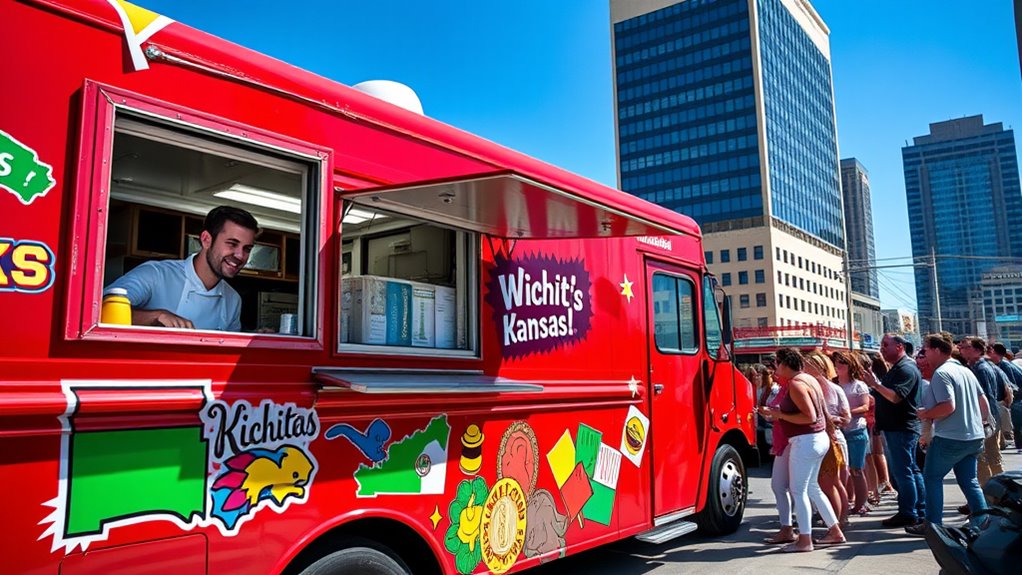
Before launching your food truck, you need to understand Kansas’s license requirements and sanitation protocols to stay compliant. You’ll also want to familiarize yourself with designated street vending zones in Wichita to choose the best locations. Getting these details correct ensures your business runs smoothly and avoids costly penalties. Additionally, understanding dog names can help you decide on a memorable and appealing name for your food truck, making it stand out to potential customers.
Kansas Food Truck License Requirements
Understanding the Kansas food truck license requirements is essential for launching your business legally and smoothly. You need to ascertain compliance with state and local regulations before hitting the road. Here are three key steps:
- Obtain a Kansas food truck license through the Kansas Department of Agriculture, which involves submitting application forms and paying fees.
- Secure a Mobile Food Vendor Permit from the City of Wichita, ensuring your vehicle meets local safety and health standards.
- Focus on food truck branding and vehicle customization to attract customers, but remember that your vehicle must also pass inspection for compliance.
Sanitation Protocols and Recordkeeping
Since proper sanitation is essential for passing health inspections and protecting customers, you must follow specific protocols to keep your food truck compliant. Implement strict cleaning protocols daily, including sanitizing surfaces, utensils, and equipment properly. Regular handwashing and glove use are vital for maintaining food safety standards. Keep detailed records of your cleaning schedules, inspections, and any corrective actions taken to demonstrate compliance. Kansas health departments often require documentation of food safety practices, so stay organized and up-to-date. Proper recordkeeping helps identify areas for improvement and ensures you’re ready for inspections. Remember, consistent sanitation and thorough recordkeeping aren’t just regulatory requirements—they’re crucial for delivering safe, high-quality food to your customers.
Designated Street Vending Zones
Managing designated street vending zones is essential for legally operating your food truck in Wichita, KS. These zones are part of local street vending regulations and make sure your business stays compliant with zoning laws. To navigate this successfully:
- Research the specific vending zones approved by Wichita city ordinances to avoid violations.
- Obtain any necessary permits or licenses required for vending within these designated areas.
- Regularly verify zoning compliance, as zones can change or update, impacting where you can operate safely.
Understanding local requirements helps prevent fines or shutdowns. You must follow street vending regulations closely and operate only within approved zones. This approach ensures your food truck runs smoothly and legally in Wichita.
Setting Up Your Base of Operations

Choosing the right shared kitchen and licensing options is key to starting your food truck smoothly. You’ll also need to select custom kitchen equipment that fits your menu and space. Let’s explore how to set up a functional and compliant base of operations in Wichita. Additionally, understanding food truck regulations and local permits can help avoid legal issues and ensure smooth operation.
Shared Kitchen Licensing Options
Setting up your food truck in Wichita often involves maneuvering various licensing options, and shared kitchen spaces can be a practical choice. Shared kitchen licensing allows you to use communal cooking facilities, reducing startup costs and easing the licensing process. Here are some key points to consider:
- Verify if the shared kitchen has the necessary shared kitchen licensing to operate legally.
- Ensure the space complies with local health and safety regulations for communal cooking.
- Check if the shared kitchen offers flexible hours to fit your schedule and menu needs.
Using a shared kitchen simplifies compliance and provides a professional environment for preparing your food, making it easier to start your food truck venture in Wichita.
Custom Kitchen Equipment Selection
Selecting the right kitchen equipment is essential for establishing an efficient and functional food truck. With custom kitchen options, you can tailor your setup to match your menu and workflow. Focus on equipment selection that maximizes space and meets health codes. Consider a compact refrigerator, a combination oven, and versatile prep stations. Prioritize durability and energy efficiency to keep costs low. Think about your specific cooking needs—whether you need fryers, grills, or steamers—and choose equipment that fits your menu. Custom kitchen designs allow you to optimize layout for smooth operation and quick service. By carefully selecting your equipment, you’ll create a streamlined workspace that helps you serve quality food quickly and reliably. Proper equipment selection is the foundation of a successful food truck business.
Budgeting and Financing Your Food Truck

To get your food truck up and running, you’ll need to think about your initial vehicle modification costs and how to cover them. Exploring startup capital sources like loans, investors, or personal savings can help you secure the funds you need. Don’t forget to budget for liability coverage and payroll expenses to keep your business protected and compliant. Additionally, understanding your interest rate when applying for financing can significantly impact your overall expenses.
Initial Vehicle Modification Costs
Modifying your food truck for operations can be a significant expense, but understanding the costs upfront helps you plan your budget effectively. Vehicle customization and equipment upgrades are key components of initial modification costs. Here are three main areas to take into account:
- Vehicle customization: This includes painting, signage, and interior layout changes to match your brand and menu needs.
- Equipment upgrades: Installing appliances like grills, fryers, refrigeration, and sinks ensures your truck is fully functional.
- Permits and safety modifications: These are necessary for compliance with local health and safety standards, adding to your overall costs.
Startup Capital Sources Available
Funding your food truck startup involves exploring various sources of capital to cover both initial modification costs and ongoing expenses. You might consider applying for startup grants, which are non-repayable funds often available through local government programs or industry organizations. These grants can substantially reduce your upfront costs. Additionally, angel investors are another option; they are individuals willing to invest in your business in exchange for equity or a return on investment. Pitching to angel investors requires a solid business plan and a compelling vision for your food truck. While loans are also common, grants and angel investments can provide more flexible funding options. By combining these sources, you increase your chances of securing enough capital to launch and sustain your food truck in Wichita, KS.
Liability and Payroll Considerations
Managing liability and payroll is essential for budgeting and financing your food truck, as these expenses directly impact your ongoing costs and legal responsibilities. Proper insurance coverage protects you from potential claims and damages, while understanding payroll taxes ensures compliance and accurate budgeting. To stay on top of these factors, consider these steps:
- Secure extensive insurance coverage that includes liability, vehicle, and workers’ compensation.
- Calculate payroll taxes carefully, including Social Security, Medicare, and unemployment taxes.
- Budget for ongoing costs related to liability coverage and payroll taxes to prevent surprises in your expenses.
Designing Your Menu and Pricing Strategy
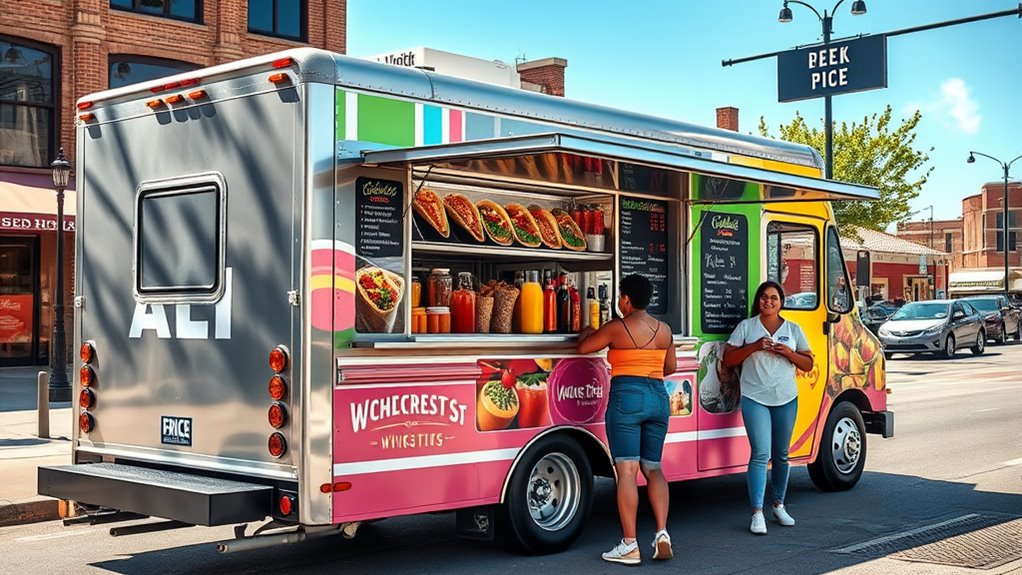
When designing your menu, focus on using fresh, local ingredients to attract customers who value quality. Set your prices based on ingredient costs to guarantee you stay profitable while offering fair value. Balancing these elements helps create a menu that’s both appealing and sustainable. Incorporating mindful consumption into your sourcing and pricing strategies can further enhance sustainability and customer satisfaction.
Fresh, Local Ingredient Sourcing
Using fresh, local ingredients can elevate your food truck’s menu and distinguish it in Wichita’s competitive scene. Focus on sustainable sourcing by building relationships with local farmers and vendors, guaranteeing high-quality produce and meats. Incorporate seasonal menus that adapt throughout the year, taking advantage of peak flavors and reducing costs. To succeed, consider these strategies:
- Prioritize ingredients that are in season to maximize freshness and appeal.
- Partner with local growers to ensure a steady supply of sustainable sourcing options.
- Develop a flexible menu that highlights seasonal ingredients, reducing waste and keeping your offerings exciting.
Pricing Based on Ingredient Costs
Setting your menu prices starts with calculating your ingredient costs accurately. Knowing the true costs of ingredients helps you develop effective pricing strategies that guarantee profitability. Begin by tracking how much each item costs to prepare, including raw ingredients and portion sizes. This allows you to determine a baseline for your prices, ensuring you cover costs and make a profit. Consider adding a markup that balances competitiveness with your need to stay profitable. Keep in mind that ingredient costs can fluctuate, so regularly reviewing your expenses is crucial. By understanding your ingredient costs thoroughly, you can set prices that attract customers while maintaining healthy margins. This strategic approach helps you build a sustainable food truck business in Wichita, KS.
Technology and Operations
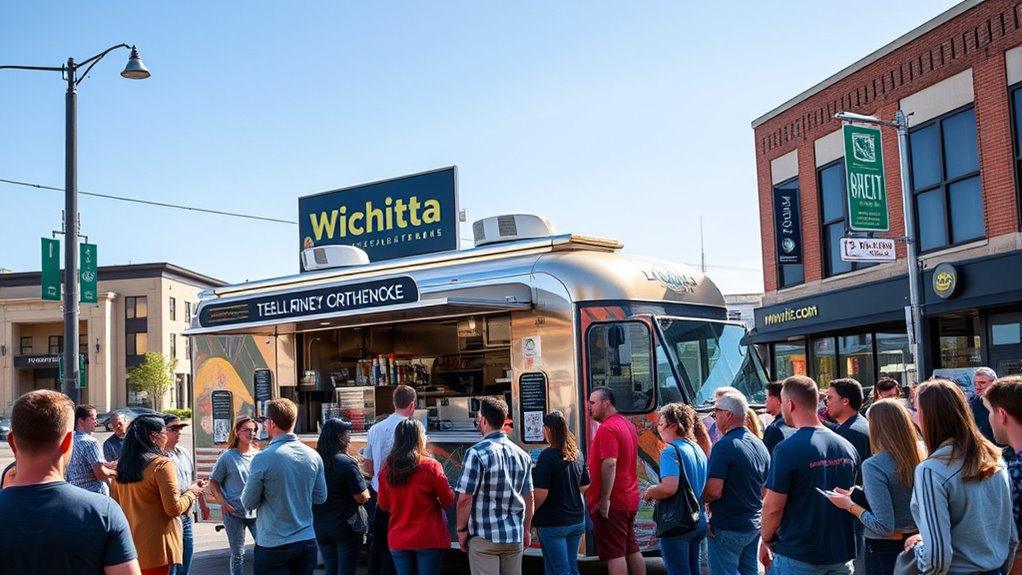
Using wireless card readers and apps, you can process payments quickly and securely, keeping your lines moving. Mobile POS systems help you manage orders and sales on the go, making operations smoother. Stock tracking tools guarantee you stay on top of inventory, so you never run out of essential supplies.
Wireless Card Readers and Apps
Wireless card readers and apps have revolutionized how food trucks handle transactions, making payments faster and more secure. With digital payments, you can accept credit and debit cards seamlessly, reducing cash handling and speeding up service. These tools also integrate with inventory management systems, helping you track stock levels in real-time and minimize waste. To optimize your setup, consider these options:
- Choose a reliable wireless card reader compatible with your POS app.
- Use apps that support contactless payments for quick transactions.
- Select software that syncs with your inventory management system for accurate stock control.
Mobile POS and Stock Tracking
Implementing a mobile POS system streamlines your sales process and keeps your operations running smoothly. With a mobile POS, you can quickly process transactions on the go, reducing wait times and improving customer satisfaction. It also integrates seamlessly with stock tracking, giving you real-time updates on inventory levels. This means you’ll always know what’s selling and when to restock, preventing shortages or overstocking. Mobile POS systems often include features like sales reporting and order management, helping you make informed decisions on the fly. By combining mobile POS and stock tracking, you guarantee your food truck operates efficiently and stays profitable, freeing up more time to focus on delivering great food and excellent service.
Marketing and Growing Your Presence
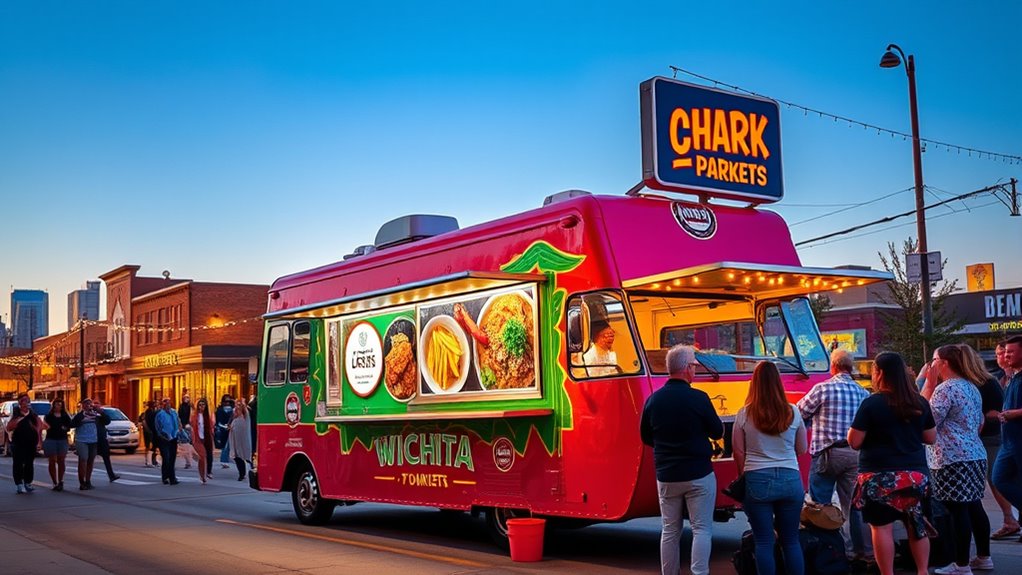
You can boost your food truck’s visibility by targeting popular local event venues where crowds gather. Sharing engaging Instagram food stories helps attract new customers and keeps your followers excited. Combining these strategies will help grow your presence and drive more business.
Popular Local Event Venues
Popular local event venues in Wichita offer prime opportunities to boost your food truck’s visibility and attract new customers. Attending these events allows you to showcase your food truck decor and create a memorable experience that encourages customer loyalty. To maximize your presence, consider these options:
- Farmers Markets – Engage with community members and introduce your offerings in a lively, family-friendly atmosphere.
- Music Festivals – Capture the attention of large crowds and showcase your unique decor to stand out.
- Community Events – Partner with local organizations to participate in charity runs, fairs, or holiday celebrations, increasing your exposure and building a loyal customer base.
Engaging Instagram Food Stories
Leveraging Instagram food stories is a powerful way to keep your audience engaged and attract new customers to your Wichita food truck. Use vibrant food photography to showcase your dishes fresh and appealing. Incorporate behind-the-scenes clips and daily specials to create a sense of urgency and connection. Collaborate with local influencers to extend your reach and gain credibility. Consider the following strategies:
| Strategy | Benefit |
|---|---|
| Daily Stories | Keeps your audience engaged consistently |
| Influencer Collaborations | Attracts new followers and customers |
| Behind-the-Scenes Content | Builds authenticity and loyalty |
| Highlight Customer Photos | Encourages user-generated content |
Consistently posting engaging stories can elevate your brand, boost foot traffic, and help grow your presence in Wichita.
Master Local Event Partnerships

Partnering with local events is essential for boosting your food truck’s visibility and sales in Wichita. By engaging with local food festivals and community markets, you can attract new customers and build a loyal following. To master these partnerships:
- Reach out early to event organizers to secure spots at popular local food festivals and markets.
- Offer exclusive menu items or specials tailored to the event’s audience.
- Promote your participation on social media to generate buzz and increase foot traffic.
Building strong relationships with event coordinators helps you stay informed about upcoming opportunities. These partnerships not only increase your exposure but also position your food truck as a key part of Wichita’s vibrant food scene. Consistent involvement in community events will boost your brand and sales over time.
Frequently Asked Questions
What Permits Are Required Specifically for Food Trucks in Wichita?
In Wichita, you’ll need a city business license and health department permit for your food truck. Make certain to comply with parking regulations, as you may need specific permissions to park legally. Your truck must pass health department inspections to ensure food safety standards are met. Keep track of renewal requirements and any additional permits depending on your menu or location to operate smoothly and legally.
How Do I Find the Best Locations for My Food Truck?
Like a captain charting new waters, you should explore busy areas with high foot traffic, considering customer demographics and parking regulations. Visit downtown spots, parks, and event venues during peak hours, and talk to local businesses for insights. Use social media to gauge popular locations and attend community events. This proactive approach helps you find prime spots where your food truck can thrive and attract loyal customers.
Are There Any Local Food Safety Standards Unique to Wichita?
Yes, Wichita has specific local health ordinances you need to follow, which emphasize food safety standards for mobile vendors. You’ll need to complete approved food safety training to guarantee compliance and protect your customers. Contact the Sedgwick County Health Department for detailed requirements and resources, including training programs. Staying up-to-date with local health ordinances helps you operate legally and maintain high food safety standards for your food truck.
What Are Common Challenges Faced by Food Truck Owners in Wichita?
You’ll face challenges like maintaining your truck, ensuring regular maintenance, and standing out through customer engagement. Keeping your truck in top shape prevents breakdowns, while engaging with customers builds loyalty and boosts sales. Weather fluctuations and parking restrictions can also pose hurdles. Staying proactive with truck maintenance and focusing on excellent customer service helps you overcome these challenges, making your Wichita food truck a local favorite.
How Can I Connect With Local Wichita Food Truck Communities?
You might think connecting with Wichita’s food truck community is a chore, but it’s actually fun! Attend food truck meetups and local culinary events to mingle with fellow owners. These gatherings offer great networking, sharing tips, and even collaborations. Jump into social media groups or forums dedicated to Wichita’s food scene. By showing up, you’ll build relationships, gain support, and turn that perceived challenge into an enjoyable part of your journey.
Conclusion
Starting a food truck in Wichita, KS, is an exciting venture that combines local flavor with entrepreneurial spirit. By understanding food trends, meeting city requirements, and crafting an irresistible menu, you set yourself up for success. Will you take the leap and turn your culinary dreams into reality? With the right planning and passion, you’ll be serving up success in no time. Are you ready to hit the streets and make your mark?
